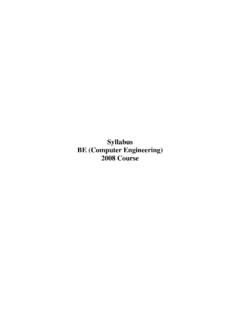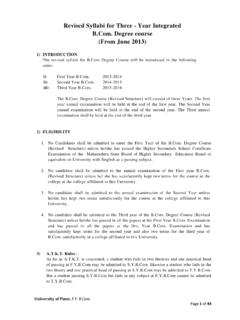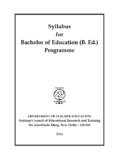Transcription of Revised Syllabi for Three- Year Integrated B. Com. …
1 Revised Syllabi for three - year Integrated B. Com. Degree course (from June 2008). 1) INTRODUCTION. The Revised Syllabi for Degree Course will be introduced in the following order- i) First year 2008-09. ii) Second year 2009-2010. iii) Third year 2010-2011. The Degree Course ( Revised Structure ) will consist of three Years. The first year annual examination will be held at the end of the first year . The Second year annual examination will be held at the end of the second year . The Third annual examination shall be held at the end of the third year . 2) ELIGIBILITY. 1) No Candidates shall be admitted to enter the First year of the Degree Course ( Revised Structure) unless he/she has passed the Higher Secondary School Certificate Examination of the Maharashtra State Board of Higher Secondary Education Board or University with English as a passing subject. 2) No candidate shall be admitted to the annual examination of the First year ( Revised Structure ) unless he/ she has satisfactorily kept two terms for the course at the college at the college affiliated to this University.
2 3) No candidate shall be admitted to the annual examination of the Second year unless he/she has kept two terms satisfactorily for the course at the college affiliated to this University. 4) No candidate shall be admitted to the Third year of the Degree Course ( Revised Structure) unless he/she has passed in all the papers at the First year Examination and has passed in all the papers at the first year Examination and has satisfactorily kept terms for the second year and also two terms for the third year of satisfactorily in a college affiliated to this University. 3) Rules : As far as is concerned, a student who fails in two theory and one practical head of passing at may be admitted to likewise a student who fails in the two theory and one practical head of passing at may be admitted to But a student passing but fails in any subject at cannot be admitted to 4) (A) Revised Structure of Course.
3 Compulsory Group Compulsory Group Compulsory Group 1. Functional English 1. Business 1. Business Communication Regulatory Framework (M. Law). 2. Financial Accounting 2. Corporate Accounting 2. Advanced Accounting 3. Business 3. Business 3. Indian and Global Economic Economic Economic Development or 3. International Economics 4. Mathematics and 4. Business 4. Auditing and Taxation Statistics OR Management 5. Computer Concepts and Programming. 6. Optional Group 6. Optional Group Special Papers (any one of the (any one of the 6. II and III. following) following). Special Subject Paper I. a) Office Management a) Business a) Business Administration b) Banking and Finance b) Banking & Finance b) Banking and Finance c) Commercial c) Business Laws and c) Business Laws and Geography Practices Practices d) Defence Budgeting d) Co-operation and Rural d) Co-operation and Rural Development Development e) Co- operation e) Cost and Works e) Cost and Works Accounting Accounting f) Managerial Economic f) Business Statistics f) Business Statistics g) Business g) Business Entrepreneurship Entrepreneurship Optional Group (Any one of the Following).
4 A) Essential of E- h) Marketing h) Marketing Management Commerce Management b) Insurance & Transport i) Agricultural and i) Agricultural and Industrial Economics Industrial Economics c) Marketing and j) Defence Budgeting, j) Defence Budgeting, Salesmanship Finance and Finance and Management Management d) Consumer Protection k) Insurance , Transport k) Insurance, Transport &. & Business Ethics & Tourism Tourism e) Business Environment l) Computer Application l) Computer Application & Entrepreneurship f) Foundation Course In Commerce 7. MIL / MEL / AIL. Revised Syllabus 2008. University of Pune Degree Course Equivalent Subjects/ Course under the Revised Syllabus from June 2008. 2004 1999. 1. Functional English 1. Functional English 2. Financial Accounting 2. Accountancy 3. Business Economics 3. Business Economics 4. Mathematics & Statistics 4. Commercial Mathematics & Statistics 5.
5 Computer Concepts & Programming 5. Computer Concepts & Programming 6. Office Management 6. Office Management 7. Banking & Finance 7. Banking & Finance 8. Business Environment & 8. Business Entrepreneurship Entrepreneurship 9. Defence Budgeting 9. Public Enterprises 10. Co- operation 10. Co- operation 11. Managerial Economics 11. Managerial Economics 12. Essential of E-Commerce 12. Purchasing & Storekeeping 13. Insurance & Transport 13. Insurance & Transport 14. Marketing & Salesmanship 14. Salesmanship & Sales Management 15. Consumer Protection & Business 15. Consumer Protection & Business Ethics. Ethics. 16. Commercial Geography 16. Commercial Geography 17. Foundation Course in Commerce 17. Foundation Course in Commerce 18. Additional English 18. Additional English 19. Marathi 19. Marathi 20. Hindi 20. Hindi 21. 21. 22. 22. 23. 23. 24. Consumer Protection 24. (B) Subjects Carrying Practicals There will be practical examination for the for the subject Financial Accounting.
6 There will be practical and practical examinations for the special subjects at and levels. There will be Practical for the level Compulsory subject Business Communication & for Auditing & Taxation. (C) A Student must offer the same Special Subject at which he has offered at (D) In an exceptional cases, a student may change the subject chosen by him at second year during the first term of the third year provided he keeps the additional terms of the new subject at 4. EXTERNAL CANDIDATES. 1) The student who has registered his name as the external student will appear at the annual examination. 2) The result of external student will be declared on the basis of annual examination of 80 marks for practical subjects by covering the same out of 100. 3) No foreign student shall be allowed to register as an external student. 5. MEDIUM OF INSTRUCTIONS. Medium of instructions of the degree course shall be either in Marathi or English, except languages.
7 The Medium of instructions for Business Communication ( ) shall be in English. 6. WORKLOAD. The present norms of workload of lectures, tutorials and practicals per subject in respect of Course shall continue. 7. UNIVERSITY TERMS. The dates for the commencement and conclusion of the first and the second terms shall be determined by the University Authorities. The terms can be kept only by duly admitted students. The present relevant ordinances pertaining to grant of terms will be applicable. 8. VERIFICATION AND REVALUATION. The candidate may apply for verification and revaluation or result through Principal of the College which will be done by the University as per ordinance framed in that behalf. 9. EQUIVALENCE AND TRANSITORY PROVISION. The University will conduct examination of old course for next three academic years from the date of implementation of new course.
8 The candidate of old course will be given three chances to clear his subjects as per the old course and thereafter he will have to appear for the subjects under new course as per the equivalence given to old course. 10. RESTRUCTURING OF COURSES. This new Revised structure shall be made applicable to the colleges implementing Restructured Programme' at the undergraduate level from June, 2004. The existing pattern of C', D', and E' Components shall be continued. The college under the Restructured Programme shall revise their structure in the light of the new structure to be introduced from June 2004. 11. SETTING OF QUESTION PAPERS. 1) A candidate shall have the option of answering the question in any of the subjects either in Marathi or English except languages. 2) The question papers shall be framed so as to ensure that no part of the syllabus is left out of study by a student.
9 3) The question paper shall be balanced in respect of various topics outlined in the syllabus. 4) The question papers shall have combination of long and short answer type question. As far as possible short answer type questions should not exceed 15 to 20 percent. 5) There shall be no overall option in the question paper, instead, there shall be internal option such as either/ or and three short answers out of five etc. 12. The subject wise Revised Syllabus for Course shall be as given in the following pages. [New Syllabus from June 2008]. Financial Accounting Objective: To impart basic accounting knowledge. Unit Term - I No of Lectures I Introduction : Meaning and scope of Accounting: Need, development and definition of accounting, Branches of accounting, Accounting Standards in India, Concepts, Objectives, Benefits, Overview of Accounting Standards in 6. India, Study of AS 1.
10 II Reconstitution of Partnership Firms: Admission of a Partner, Retirement and death of a partner including 12. treatment of goodwill. III Accounting for Partnership Firms: Dissolution of partnership firms including piecemeal distribution of assets. 10. IV Advanced Issues in Partnership Accounts -Amalgamation of Partnership Firms 10. - Conversion of a Partnership Firm into a Limited Company: V Final Accounts of Co-operative Societies [Credit Co-op Societies and Consumers Co-op Societies only], Allocation of profit as per 10. Maharashtra Co-op Societies' Act, Final accounts of Credit Co-op. Society and Consumers Co-op. Society. 48. TOTAL. Unit No of Term - II Lectures VI Accounts of Not for-Profit Organization & Accounts Of Professionals: 12. A. Meaning of not for Profit Organisation, Preparation of an Income And Expenditure Account, and Balance Sheet from Receipts and Payment Account- Preparation of a Receipts and Payment Account from an Income And Expenditure Account.
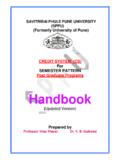
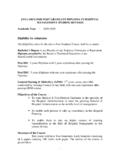

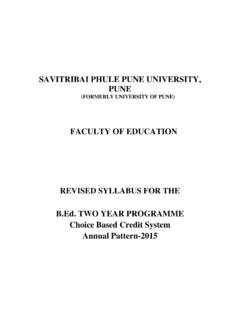
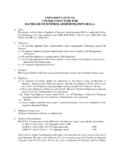
![[4372]-101 - Savitribai Phule Pune University](/cache/preview/f/c/3/4/c/a/0/f/thumb-fc34ca0f7a382c46206f2b1007598e60.jpg)

